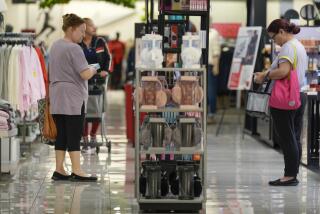Fed Again Boosts Economy’s Liquidity
- Share via
WASHINGTON — The Federal Reserve pumped massive amounts of extra cash into the American economy Friday and arranged for huge dollar swaps with the central banks of Canada and England as it prepared for the reopening of U.S. financial markets in the wake of Tuesday’s terrorist attacks on the World Trade Center and the Pentagon.
The Fed provided banks and investment dealers more than $80 billion in short-term loans for use over the weekend by individuals and companies caught short by the chaos of the attacks. By late Friday, it also had arranged for $90 billion in swaps to help foreign banks and businesses meet their dollar obligations.
Both steps were meant to keep the global financial system liquid as investors grapple with the dicey problem of valuing stocks and bonds in the aftermath of the carnage. Without them, the markets could have seized up as people found themselves unable to borrow and pay bills, setting off a chain reaction of breakdown and bankruptcy.
Even with the swift Fed action, however, there were new signs Friday the economy was in for a tough time and probably would slip into recession, if it isn’t already in one.
U.S. industrial production fell in August for an 11th straight month, Fed figures showed. Production at the nation’s factories, mines and utilities fell 0.8% after falling 0.1% in July. The decline, almost three times greater than analysts had expected, extended a losing streak that is now the longest since 1960.
The terrorist attacks seem likely to stretch the factory slump still further as consumers buy less and producers cope with bottlenecks created by the shutdown of air transit and tighter security at U.S. borders.
One major producer, Ford Motor Co., trimmed its quarterly production estimate by more than 100,000 vehicles Friday. Ford said it expected to build between 810,000 and 820,000 cars and trucks in the quarter ending Sept. 30, down from the 930,000 it had previously estimated, and the 1.052 million it built in the same period last year. Other car makers have made similar reductions.
In another piece of bad economic news, crude oil prices rose to nearly $30 a barrel Friday on fears that U.S. retaliation for this week’s events would destabilize the oil-rich Middle East. Prices in New York and London have climbed more than 7% since Tuesday to as much as $29.62 a barrel.
“If there was any question about a recession, I think it’s behind us,” said Richard B. Hoey, chief economist with the Dreyfus Corp., a New York mutual fund company.
Fred Breimyer, chief economist with Boston-based State Street Corp., predicted that the economy’s growth rate for the April-through-June quarter, now estimated at an anemic 0.2% annual pace, would be revised down to zero. He predicted growth during the summer and fall quarters would be “sharply negative.”
Initially, many analysts had said the terrorist attacks, though destructive, would have only minor effects on the economy. But there appears to be growing recognition that damage and loss of life have shaken the country and dampened consumers’ readiness to buy.
Fed policymakers are now widely expected to react to the bleaker economic outlook by slashing short-term interest rates.
They already have lowered the most important of those rates from 6.5% to 3.5% in seven steps since the start of the year. Most analysts originally thought they would trim another quarter-point, but now they think the additional cuts could total as much as a full point. The Fed’s policymaking body meets Oct. 2.
For the moment, however, the Fed’s principal concern is getting plenty of extra cash into the economy.
Before Friday, the central bank had injected an extra $70 billion through overnight repurchase agreements with banks and dealers. On Friday, it injected $81.25 billion for the weekend.
A repurchase agreement is effectively a secured, short-term loan in which the Fed buys a bond or other financial instrument from a bank and gives it cash. The bank gets to use the cash for a short period, such as a day, before the transaction is unwound; the Fed returns the bond and the bank returns the money.
In addition to repurchase agreements, the Fed boosted its outright loans to banks through the so-called “discount window” from its usual $11.7 billion to $45.5 billion by Wednesday.
It also arranged a series of deals with foreign central banks to ensure plenty of dollars are available overseas. Among the deals: a $50-billion swap Thursday with the European Central Bank and $10-billion and $30-billion swaps Friday with the Bank of Canada and the Bank of England.
Fed officials accompanied the cash Friday with a pep talk of sorts to bankers, encouraging them to be prudent but lend generously in order to help offset the effects of the attacks.
“The Federal Reserve has a long-standing policy of encouraging bankers to work flexibly with customers . . . who have been affected by disasters,” the Fed said in a statement.
More to Read
Inside the business of entertainment
The Wide Shot brings you news, analysis and insights on everything from streaming wars to production — and what it all means for the future.
You may occasionally receive promotional content from the Los Angeles Times.










